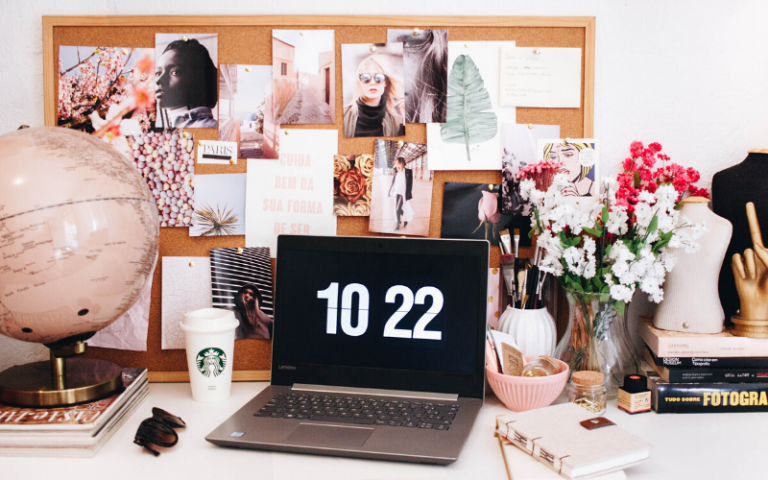10 top tips for remote learning
16 November 2020
Remote learning can be very different from sitting in a lecture theatre. UCL student Julie Colonna shares some ways you can still learn effectively and maintain a healthy work-life balance.

Whether you're a distance learner, catching up on lectures or studying remotely for other reasons, it can be quite the adjustment from a lecture theatre. Although learning remotely gives you lots of flexibility, it's important that you have the right working space, mind frame and routine in place.
Here are some great tips that will have you ready for remote learning.
1. Have a routine
As well as waking up on time and attending lectures online, it’s important to schedule in time to go over notes, some sort of exercise and time for hobbies and interests.
Writing down tasks first thing in the morning will allow you to set your intentions for the day and feel motivated to fulfil them.
This free ‘to do’ list template online can help you plan out your days.
Write every task, big and small, that you want to complete and highlight your top three priorities for the day.
2. Communicate with your lecturers and classmates
Remember that the same online tools (Moodle, Zoom, Microsoft Teams etc.) being used to deliver your classes can also be a great way to keep in contact with lecturers and classmates.
Ask questions during lectures, discuss topics in forums with others in your class and reach out via email.
Although your lecturers can’t be there physically with you, your education is still priority and they’re there to help.
3. Practice mindfulness and be kind to yourself
Set aside some time each day for meditation. It could be as little as five minutes or as much as an hour. Meditation will help to reduce stress and anxiety, as well as helping you relax.
You can subscribe to 10 minute mind or download apps such as Calm or Headspace.
4. Create a work environment
Making a space dedicated to just studying will help you to concentrate better. To create a productive workspace, make sure the objects around you are only those that relate to studying.
Ensure your space is free of clutter and don’t use your bed as a place to study – it’s important to keep this as a place of rest.
If you don’t have a desk get creative! You can use a nightstand, a shelf or sit on the floor.
I also recommend working by a window for some natural light.
5. Get out of your pyjamas and have breakfast
It's important to get up and ready for the day, as if you were heading out or to campus.
Wearing something other than your pyjamas will make you feel ready to take on any tasks you have. As they say, look good, feel good.
6. Make sure you’ve planned your lunch in advance
Having lunch is important, to give you that boost and also to break up tasks.
Avoid making things from scratch at lunch, as this will take up a lot of time. You could have something quick and healthy like a sandwich, fruit, nuts and seeds or pasta.
You might even want to set aside a portion of dinner for lunch the next day.
7. Cancel out distractions
When you’re studying from home, it can be quite easy to become distracted.
The easiest way to achieve focus and producitivity is to distance yourself from things that might cause a distraction.
You could put your phone in another room, in a drawer or switch it to ‘Airplane mode’.
Another way is to download ‘Cold Turkey’ on your laptop or phone, to prevent yourself from logging into social media while you’re studying. The app lets you temporarily freeze pages you know you might compulsively visit when studying.
8. Adjusting to online lectures
It’s important to remember that online lectures are just lectures and content delivered in a different way.
Listen to them as you would a normal lecture and if watching a recording, try to watch these at normal speed. Hitting the pause button too often may allow you to get distracted easily.
Your priority should be understanding the material more than anything else.
Also, if you are watching recorded lectures, watch them at a time when you’ll be able to give them your full attention. For some this may be first thing in the morning, for others this may be in the evening.
9. Get over the afternoon slump
Channeling your energy elsewhere can help you get over the dip in energy during the afternoon. by channelling your energy elsewhere.
If you find yourself feeling restless and unfocused around 3 to 5pm, you might want to do something else for half an hour. Tidy your room, walk around the house for a bit, try some desk yoga or grab a snack.
When you sit back down, you’ll have a clearer mind and be ready to focus for another few hours.
10. Have other activities planned
Plan out activities at the end of the day that will help you take your mind off studying, rest and recharge.
You could bake, watch a movie, call friends and family or have a bath.
Julie Colonna, BA English Language and Literature
 Close
Close

